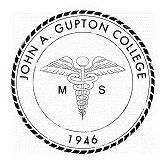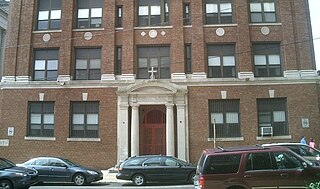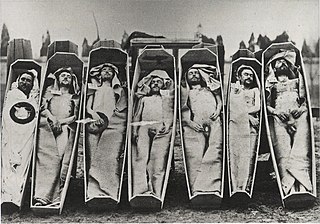A funeral home, funeral parlor or mortuary, is a business that provides burial and funeral services for the dead and their families. These services may include a prepared wake and funeral, and the provision of a chapel for the funeral.

Postgraduate or graduate education refers to academic or professional degrees, certificates, diplomas, or other qualifications pursued by post-secondary students who have earned an undergraduate (bachelor's) degree.
Embalming is the art and science of preserving human remains by treating them to forestall decomposition. This is usually done to make the deceased suitable for public or private viewing as part of the funeral ceremony or keep them preserved for medical purposes in an anatomical laboratory. The three goals of embalming are sanitization, presentation, and preservation, with restoration being an important additional factor in some instances. Performed successfully, embalming can help preserve the body for a duration of many years. Embalming has a very long and cross-cultural history, with many cultures giving the embalming processes a greater religious meaning.

A morgue or mortuary is a place used for the storage of human corpses awaiting identification (ID), removal for autopsy, respectful burial, cremation or other methods of disposal. In modern times, corpses have customarily been refrigerated to delay decomposition.
Bachelor of Business Administration (BBA) is a bachelor's degree in business administration awarded by colleges and universities after completion of undergraduate study in the fundamentals of business administration and usually including advanced courses in accounting, economics, finance, management, marketing, strategic management, supply chain management, and other key academic subjects associated with the academic discipline of business management.

A funeral director, also known as an undertaker or mortician, is a professional involved in the business of funeral rites. These tasks often entail the embalming and burial or cremation of the dead, as well as the arrangements for the funeral ceremony. Funeral directors may at times be asked to perform tasks such as dressing, casketing, and cossetting. A funeral director may work at a funeral home or be an independent employee.

John A. Gupton College is a private 2-year college in Nashville, Tennessee that specializes in mortuary science. Founded in 1946, it awards the Associate of Arts degree in Funeral Service. Gupton College is accredited by both the Commission on Colleges of the Southern Association of Colleges and Schools and the American Board of Funeral Service Education. Gupton is located just west of downtown Nashville, in the same building as the Tennessee Funeral Directors Associational Office.

Embalming chemicals are a variety of preservatives, sanitising and disinfectant agents, and additives used in modern embalming to temporarily prevent decomposition and restore a natural appearance for viewing a body after death. A mixture of these chemicals is known as embalming fluid and is used to preserve bodies of deceased persons for both funeral purposes and in medical research in anatomical laboratories. The period for which a body is embalmed is dependent on time, expertise of the embalmer and factors regarding duration of stay and purpose.

Elmont Memorial Junior-Senior High School (EMHS) is a co-educational, public high school founded in 1956 for students in grades 7–12 in the hamlet of Elmont, Long Island, New York, in Nassau County, United States. The school is one of five secondary schools of the Sewanhaka Central High School District.

John W. Hallahan Catholic Girls' High School was an all-girls Roman Catholic high school located in Philadelphia, Pennsylvania, United States within the Archdiocese of Philadelphia. It is the country's first all-girls diocesan Catholic high school.

A cadaver or corpse is a dead human body that is used by medical students, physicians and other scientists to study anatomy, identify disease sites, determine causes of death, and provide tissue to repair a defect in a living human being. Students in medical school study and dissect cadavers as a part of their education. Others who study cadavers include archaeologists and arts students.
The death care industry in the United States includes companies and organizations that provide services related to death: funerals, cremation or burial, and memorials. This includes for example funeral homes, coffins, crematoria, cemeteries, and headstones. The death care industry within the U.S. consists mainly of small businesses, although there has been considerable consolidation over time.
Cincinnati College of Mortuary Science (CCMS) is a primarily two-year, non-profit, private mortuary science college, located just outside Cincinnati in the Finneytown neighborhood of Springfield Township, Hamilton County, Ohio, United States. CCMS is the oldest school of its kind in the United States, tracing its history back to the Clarke School, which organized its first class on March 8, 1882. The school was later called the Cincinnati College of Embalming, arriving at the present name in 1966. CCMS offers Associate's degrees and bachelor's degrees in mortuary science.
Neglect is defined as giving little attention to or to leave undone or unattended to, especially through carelessness. Mortuary neglect can comprise many things, such as bodies being stolen from the morgue, or bodies being mixed up and the wrong one was buried. When a mortuary fails to preserve a body correctly, it could also be considered neglect because of the consequences.
PhD in management is one of the highest academic degrees awarded in the study of management science. The degree was designed for those seeking academic research and teaching careers as faculty or professors in the study of management at business schools worldwide.

Robert Michael Boetticher Sr. is an American funeral director, best known for the planning and implementation of memorial services for celebrities and notable individuals. He was the lead funeral director and embalmer for the state funerals of George H. W. Bush, Gerald Ford and Ronald Reagan, and has coordinated and directed some with the assistance of the members of the SCI Ceremonial Funeral Team of the most visible funerals in recent history.

Caitlin Marie Doughty is an American mortician, author, blogger, YouTube personality, and advocate for death acceptance and the reform of Western funeral industry practices. She is the owner of Clarity Funerals and Cremation of Los Angeles, creator of the Web series "Ask a Mortician", founder of The Order of the Good Death, and author of three bestselling books, Smoke Gets in Your Eyes & Other Lessons from the Crematory (2014), From Here to Eternity; Traveling the World to Find the Good Death (2017), and Will My Cat Eat My Eyeballs?: Big Questions from Tiny Mortals About Death (2019).
Desairology is an older term for the practices of funeral cosmetology, mortuary makeup, and restorative arts, which are a product of the practice of viewing a deceased person in their open casket prior to burial. If a family requests a viewing, the funeral director will discuss with the family how they would like the decedent to appear, and even ask the family to provide a reference photo of the deceased. This photo may be given to the desairologist. A decedent's usual hairdresser may also be called upon.
Women have had varying roles in the death care industry in the United States since its mid-nineteenth century inception.









